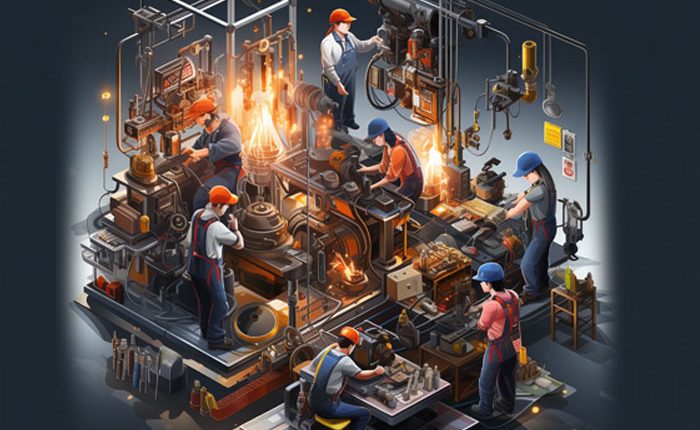In recent years, India has emerged as a global hub for innovation and technological advancement, particularly in the manufacturing sector. With a blend of traditional craftsmanship and cutting-edge technology, Indian industries are revolutionizing the way products are designed, produced, and distributed. This article explores some of the key manufacturing innovations driving this transformation in Indian industry.
Key Manufacturing Innovations
Advanced Robotics and Automation:
Indian manufacturers are increasingly adopting advanced robotics and automation to streamline production processes, improve efficiency, and ensure precision. Robots are being deployed across various industries, from automotive manufacturing to electronics assembly, reducing manual labor and enhancing productivity. Collaborative robots (cobots) are also gaining popularity, working alongside human operators to perform intricate tasks with speed and accuracy.
Additive Manufacturing (3D Printing):
Additive manufacturing, commonly known as 3D printing, is revolutionizing prototyping and small-scale production in India. This technology enables manufacturers to create complex components with minimal material wastage, offering greater design flexibility and customization. From healthcare to aerospace, Indian companies are harnessing the potential of 3D printing to develop innovative products tailored to specific customer needs.
Internet of Things (IoT) and Industry 4.0:
The integration of IoT devices and sensors into manufacturing equipment is enabling real-time monitoring and predictive maintenance, minimizing downtime and optimizing production processes. Industry 4.0 initiatives are transforming traditional factories into smart, connected facilities capable of autonomous decision-making and adaptive manufacturing. Indian companies are investing in digitalization and data analytics to drive operational efficiency and competitiveness in the global market.
Green Manufacturing Practices:
Sustainable manufacturing is gaining traction in India, driven by environmental regulations and consumer demand for eco-friendly products. Manufacturers are adopting green technologies and practices to minimize energy consumption, reduce waste, and lower carbon emissions. Renewable energy sources, such as solar and wind power, are being integrated into manufacturing operations, along with efficient water management systems and recycled materials.
Collaborative Supply Chains:
Indian manufacturers are embracing collaborative supply chain models to enhance agility and resilience in a rapidly changing business environment. By collaborating closely with suppliers, distributors, and logistics partners, companies can optimize inventory management, shorten lead times, and respond more effectively to market fluctuations and customer demands.
Focus on Skill Development and Training:
Recognizing the importance of a skilled workforce in driving innovation and productivity, Indian manufacturers are investing in employee training and development programs. Technical institutes and vocational training centers are partnering with industry stakeholders to equip workers with the knowledge and skills required for advanced manufacturing technologies, ensuring a steady pipeline of talent for the future.
Automation – A Great Enabler
Automation has indeed revolutionized various production processes across industries, offering a multitude of benefits such as enhanced productivity, consistent quality, and precision.
Enhanced Productivity:
Automation minimizes the reliance on manual labor, allowing production processes to operate round the clock without the constraints of fatigue or human limitations. This continuous operation translates into higher output levels and increased productivity. Moreover, automation can optimize workflow efficiencies by reducing idle time between tasks and automating repetitive or time-consuming processes, further boosting overall productivity.
Consistent Quality:
One of the primary advantages of automation is its ability to maintain consistent quality standards throughout the production process. Automated systems perform tasks with a high degree of precision and accuracy, reducing the likelihood of human errors or variability in product quality. By adhering to predefined specifications and quality control parameters, automation ensures that each product meets the desired quality standards, enhancing customer satisfaction and brand reputation.
Precision:
Automation technologies, such as robotics and computer numerical control (CNC) machines, excel in executing tasks with exceptional precision and repeatability. These systems are capable of performing intricate operations with micron-level accuracy, ensuring precise dimensions and tolerances in manufactured components. As a result, products manufactured through automated processes exhibit uniformity and precision, meeting the stringent requirements of modern industries such as aerospace, automotive, and electronics.
Optimized Resource Utilization:
Automation optimizes resource utilization by minimizing material wastage, reducing energy consumption, and maximizing equipment efficiency. Automated systems can precisely control variables such as temperature, pressure, and speed to optimize production parameters and minimize resource consumption. This not only reduces operational costs but also contributes to sustainability efforts by minimizing environmental impact.
Flexibility and Adaptability:
Modern automation technologies offer flexibility and adaptability to accommodate diverse production requirements and changing market demands. Programmable automation systems can be easily reconfigured or reprogrammed to switch between different product variants or adapt to new manufacturing processes. This agility enables manufacturers to respond quickly to market dynamics, launch new products faster, and stay competitive in rapidly evolving industries.
Overall, automation plays a crucial role in enhancing productivity, ensuring consistent quality, and achieving precision in various production processes. By leveraging automation technologies effectively, manufacturers can optimize operational efficiency, reduce costs, and deliver high-quality products that meet the evolving needs of customers and markets.
Conclusion
In conclusion, manufacturing innovations are propelling India’s industrial growth trajectory, fueling economic development and job creation. By leveraging emerging technologies, embracing sustainability, and fostering collaboration, Indian manufacturers are poised to compete on a global scale and drive the next wave of innovation in the manufacturing sector.




